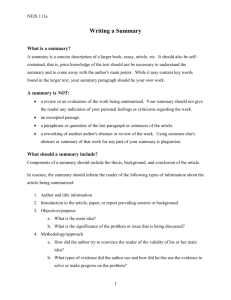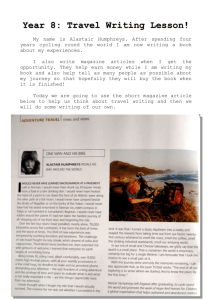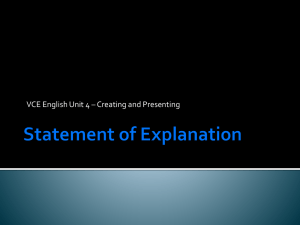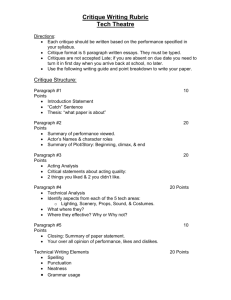Writing advice and critique guide - University of Wisconsin
advertisement
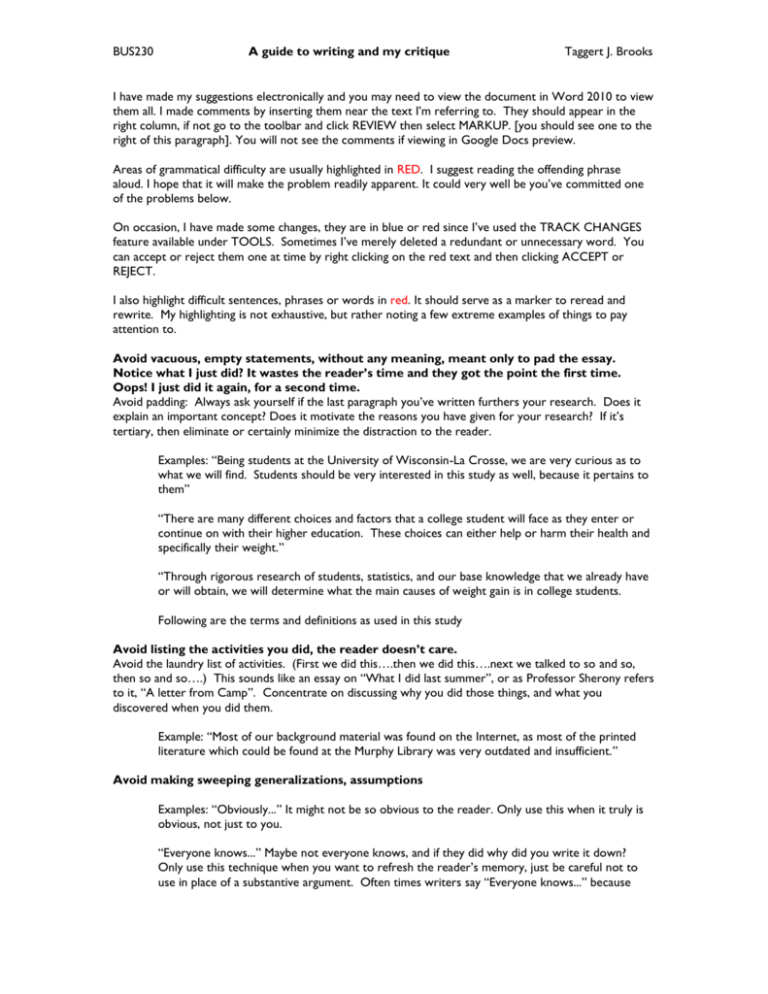
BUS230 A guide to writing and my critique Taggert J. Brooks I have made my suggestions electronically and you may need to view the document in Word 2010 to view them all. I made comments by inserting them near the text I’m referring to. They should appear in the right column, if not go to the toolbar and click REVIEW then select MARKUP. [you should see one to the right of this paragraph]. You will not see the comments if viewing in Google Docs preview. Areas of grammatical difficulty are usually highlighted in RED. I suggest reading the offending phrase aloud. I hope that it will make the problem readily apparent. It could very well be you’ve committed one of the problems below. On occasion, I have made some changes, they are in blue or red since I’ve used the TRACK CHANGES feature available under TOOLS. Sometimes I’ve merely deleted a redundant or unnecessary word. You can accept or reject them one at time by right clicking on the red text and then clicking ACCEPT or REJECT. I also highlight difficult sentences, phrases or words in red. It should serve as a marker to reread and rewrite. My highlighting is not exhaustive, but rather noting a few extreme examples of things to pay attention to. Avoid vacuous, empty statements, without any meaning, meant only to pad the essay. Notice what I just did? It wastes the reader’s time and they got the point the first time. Oops! I just did it again, for a second time. Avoid padding: Always ask yourself if the last paragraph you’ve written furthers your research. Does it explain an important concept? Does it motivate the reasons you have given for your research? If it’s tertiary, then eliminate or certainly minimize the distraction to the reader. Examples: “Being students at the University of Wisconsin-La Crosse, we are very curious as to what we will find. Students should be very interested in this study as well, because it pertains to them” “There are many different choices and factors that a college student will face as they enter or continue on with their higher education. These choices can either help or harm their health and specifically their weight.” “Through rigorous research of students, statistics, and our base knowledge that we already have or will obtain, we will determine what the main causes of weight gain is in college students. Following are the terms and definitions as used in this study Avoid listing the activities you did, the reader doesn’t care. Avoid the laundry list of activities. (First we did this….then we did this….next we talked to so and so, then so and so….) This sounds like an essay on “What I did last summer”, or as Professor Sherony refers to it, “A letter from Camp”. Concentrate on discussing why you did those things, and what you discovered when you did them. Example: “Most of our background material was found on the Internet, as most of the printed literature which could be found at the Murphy Library was very outdated and insufficient.” Avoid making sweeping generalizations, assumptions Examples: “Obviously...” It might not be so obvious to the reader. Only use this when it truly is obvious, not just to you. “Everyone knows...” Maybe not everyone knows, and if they did why did you write it down? Only use this technique when you want to refresh the reader’s memory, just be careful not to use in place of a substantive argument. Often times writers say “Everyone knows...” because BUS230 A guide to writing and my critique Taggert J. Brooks they can’t construct an argument to convince everyone, so they disarm the other side of the argument by saying “Everyone knows...” Avoid overusing the word This, and for that matter These, That are overused as well. Go through your paper, circle all the This, That, and These, then try eliminating half. Examples: “This study will...” Example: “This study took into account 67 college women from the University of Alaska Fairbanks and exposed them to two different sets of photographs” Rearrange until it sounds good. The study exposed 67 females from the University of Alaska Fairbanks to two different sets of photographs (Williams 1996). Or Williams (1996) exposed 67 females from the University of Alaska Fairbanks to two different sets of photographs. Avoid Using Passive Voice. Passive voice isn’t a grammatical error nor is it without its place. It’s just over used. http://www.unc.edu/depts/wcweb/handouts/passivevoice.html Why was the road crossed by the chicken? Rewrite this to the recognizable form “Why did the chicken cross the road?”. This is active, and a good lesson. Better writing is often achieved through merely rearranging the words you have already written until they sound better. Avoid Using: Research has shown… It has been found…. It has been reported… Who found and who showed? Avoid excessive colloquialisms. Informal language generally does not belong in written reports. It just makes you sound juvenile, so save it for the presentation and use it sparingly. I know I use it too often... Avoid Clichés. http://lifehacker.com/5091810/30-cliches-you-should-basically-avoid-going-forward Avoid Misusing Words. Today, with spellchecking software this is less of an issue, but pay attention to incorrect usage of words like there, their or effect, affect, or your, and you’re. I know they are the three that challenge me most. Check for the correct usage here: http://www.confusingwords.com/ The research hypothesis does not need to be the first sentence of the paper nor the last sentence in the first paragraph. It doesn’t even have to be in italics or made bold. A well written introduction will make your research focused, clear and unambiguous. Remember that your goal is to draw people into your research, make them interested. It may entail an explanation of the research that builds to a statement of the hypothesis. BUS230 A guide to writing and my critique Taggert J. Brooks Citations: Did they appropriately cite source material? Did they use a consistent style? For the moment they do not have to have a reference list, but they should use appropriate in-text citation. For example: According to Frank and Bernanke (2007) the stock market does not affect consumption Or this: Few researchers find the stock market affects consumption (Frank and Bernanke, 2007). Look for lazy citation practices where the end of every paragraph has a parenthetical citation. This does not help the reader understand WHICH idea in the preceding paragraph is due to the cited authors. Also do not list the journal title or the author’s affiliation in the literature review. Technology provides several tools to assist in becoming a better writer. Word 2010 provides spell check, grammar check, and readability statistics. Use the readability stats to check for passive voice. http://lifehacker.com/5170941/enable-readability-statistics-for-office-documents explanations of the statistics here http://corporategeek.info/Measure-Readability-Documents-Emails Plugging the text into this web form will provide some similar statistics http://www.ist.rit.edu/~jxs/services/TestReadability.html

